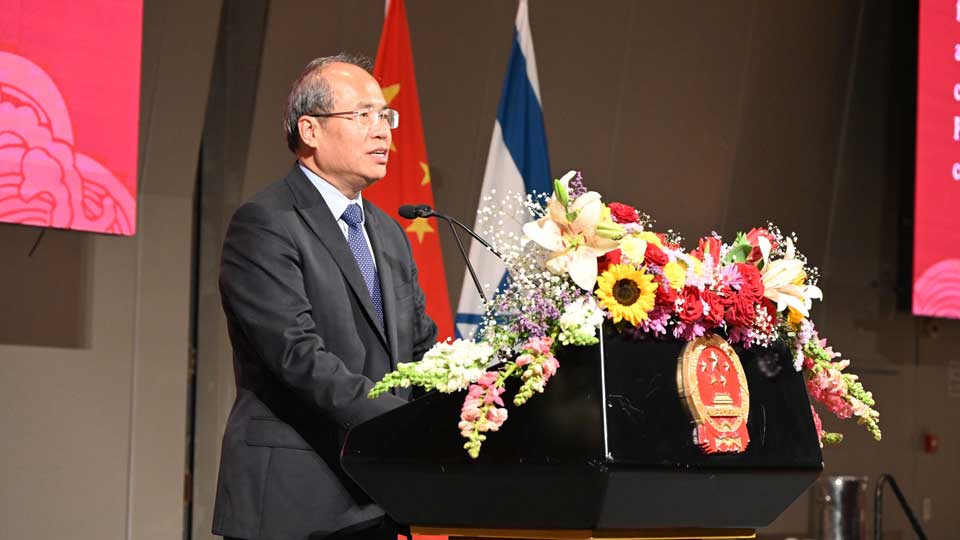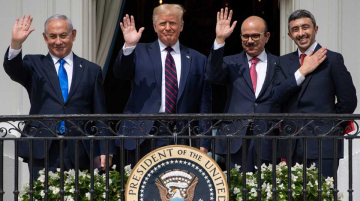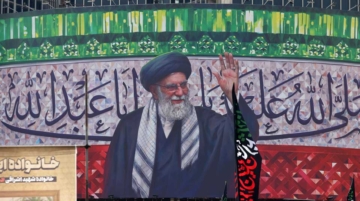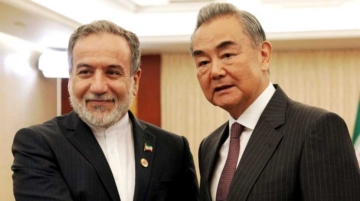
By Amanda Chen and Leonardo Bruni
China was largely an afterthought for much of the Israeli media in 2024. Amid a year marked by the aftermath of the October 7 attack, wars on several fronts, and the plight of the Israeli hostages in Gaza, Beijing’s criticism of Tel Aviv’s conduct was far from a pressing issue. Moreover, China was just one source of the widespread global condemnation directed at Israel, driven by the immense humanitarian toll of its military campaigns, its escalatory actions in the region, and the illegal, inhumane proposals put forth by members of the Netanyahu cabinet.
Nevertheless, Israeli experts on China continued to monitor Beijing’s actions and rhetoric regarding Israel, the war in Gaza, and broader developments in the Middle East. We provide an overview of their coverage in this edition of the ChinaMed Observer, drawn from an upcoming report examining trends in Israeli media discourse on China throughout 2024. The full report will also include sections covering Israeli analysts’ perspectives on China’s stance on the Red Sea crisis and the current state of Sino-Israeli economic relations.
The Long Shadow of October 7
As highlighted in our 2023 report, October 7 was a watershed moment for Israeli perceptions of China. Prior to the Hamas-led attack, there was spirited debate within Israeli media over their country’s approach to the escalating U.S.-China rivalry. While the vast majority of Israeli analysts strongly favored prioritizing ties with Washington over Beijing—viewing China’s diplomatic outreach in the Middle East as harmful to Israeli interests—some criticized the Israeli government for quickly yielding to U.S. pressure and imposing restrictions on what had previously been a flourishing technological and economic relationship with China. A small minority even cautioned against over-reliance on the U.S., suggesting that Beijing could also play a constructive role in fostering regional normalization, particularly after it helped broker the rapprochement between Iran and Saudi Arabia.
However, China’s official response to the October 7 attack and the ensuing war in Gaza completely flattened this debate. Beijing’s stance of “neutrality”—particularly its refusal to explicitly condemn Hamas and other Iranian-backed militant groups or to leverage its influence to curb their actions—was widely interpreted in Israeli media as “pro-Palestinian,” if not outright “pro-Hamas.” This position not only strained bilateral relations but also deeply alienated Israeli experts and public opinion, with even the most conciliatory voices toward China coming to view Beijing’s response as a betrayal of the strong ties developed over previous decades.
As Israeli analysts continued to interpret, explain, and condemn what they saw as morally bankrupt Chinese rhetoric, frustration with China not only persisted into 2024 but intensified.
Carice Witte, founder and executive director of SIGNAL Group, noted that “China does not intend to cut off relations with Israel, but at the same time it is harming them through its actions.”[1] Itamar Eichner, diplomatic correspondent for Ynet, explained that China’s diplomatic behavior during the war led to the collapse of the idea, previously held by many scholars and policy-makers, that a real rapprochement between the two countries was possible.
For Tuvia Gering, a researcher at the Glazer Israel-China Policy Centre at the Institute for National Security Studies (INSS), China’s bolstering of its traditional pro-Palestine rhetoric to repeatedly include Palestinian refugees’ right of return not only stands “in complete opposition to Israeli interests” but also challenges its non-interference policy by showing a clear “double standard in the face of Palestinian terrorism”:
“China’s choice to support the right of return now is a reward for Palestinian terrorism and blatant interference in Israel’s internal affairs, and is tantamount to Israeli support for Taiwan’s independence.”
China’s deteriorating relationship with Israel is also reflected in Tel Aviv’s warming ties with Taipei, characterized by increased cooperation and mobilization around shared support for liberal democracy and resilience against foreign military pressure. Pro-Palestine protests in Taiwan went mostly unreported in Israeli media which instead underscored the Taiwanese authorities’ diplomatic goodwill and multi-layered shows of solidarity following October 7, including official condemnations of Hamas and generous aid, notably a USD 70,000 donation for “the IDF and Israeli families” from the Taiwanese mission in Israel.
Other events that harmed China’s public image in Israel include Beijing’s ignoring of repeated appeals to intercede on behalf of the half-Chinese hostage Noa Argamani, who was eventually rescued in an IDF operation in June 2024. Additionally, TikTok came under scrutiny for hosting anti-Israel content, prompting senior representatives of the social media app to visit Tel Aviv to deny accusations of algorithmic and internal bias against Israel. Meanwhile, the Israeli branch of China’s University of International Business and Economics in Petah Tikva closed after only four years. The university’s president in Israel, Maj. Gen. (res.) Matan Vilnai, who previously served as ambassador to China, explained to Ynet that:
“Since the university operated under the auspices of the Chinese government, which has taken a tough stance against Israel since the war, it is believed that they decided they were not interested in continuing their activities in Israel.”[9]
These developments appear to have had a significant impact on public perceptions of China in Israel. In a survey conducted by the INSS in September 2024 only 16% of Israeli respondents viewed China a friendly country or ally of Israel.
China in the Middle East and the “Axis of Evil”
Throughout 2024, Israeli media largely maintained a negative view of China’s role in the region, very frequently grouping China alongside Russia, Iran, and Iranian “regional proxies” in a purported “axis partnership.” Independent analyst Dr. Anat Hochberg-Marom contended that the majority of Hamas’ weapons originate from Russia, China, and Iran, which she regarded as evidence of “systemic support from the Axis of Evil.” While Western intelligence sources have indicated that Hamas has also armed its fighters with weapons stolen from the IDF, as well as from assembling unexploded rockets and bombs dropped by Israel on the Gaza Strip, the perception of China as a direct backer of Hamas and Iran has remained a ubiquitous narrative in Israeli discourse.
Analyst Dean Shmuel Elmas opined in Globes that “just as Hamas is Iran, so too is China, […] Israel must acknowledge the strong alignment between China and Iran while cautiously maintaining ties with both China and Russia to avoid geopolitical setbacks.” To understand Beijing’s position in this “axis,” Carice Witte clarified that Beijing sides with Iran not because of a real alignment of values, rather, for its own ambition “to reshape the world order and dictate a security vision for the Middle East” in contrast to Western hegemony.
On China’s role in facilitating a national unity agreement between Fatah, Hamas, and 12 other Palestinian factions in July 2024, Ynet journalist Sharon Kidon interpreted Beijing’s mediation efforts as an intent to resolve regional conflicts independently from U.S. influence. Nevertheless, the relevance of the agreement, known as the “Beijing Declaration,” was widely dismissed in Israeli media. Israeli analysts argued that the agreement ignored longstanding factional disagreements and was seen as legitimizing groups such as Hamas and Palestinian Islamic Jihad, which are designated as terrorist organizations by the U.S. and other Western countries. Haaretz journalist Jack Khoury reported that for Fatah, who currently heads the internationally recognized Palestinian Authority in the West Bank, the agreement was meant to appease Beijing diplomatically and held little practical significance.
From Israel’s perspective, China’s mediation efforts and Middle East policy, including its role in the Iran-Saudi détente, were perceived as contrary to its interests, with concerns that such initiatives could undermine Tel Aviv’s position in the region. Moreover, China’s regional strategy was seen as unsustainable, as it aims to balance ties with Iran—which supports groups like Hamas, the Houthis, and Hezbollah—while also fostering relationships with Gulf countries such as Saudi Arabia and the United Arab Emirates, which are directly impacted by the Houthi crisis in the Red Sea.[18] Ultimately, disillusioned Israeli experts did not expect China to directly interfere in their multi-front war or to take actions in Israel’s favor.
A Shift in Tone?
One of the primary factors fueling Israeli resentment toward China was Beijing’s rhetoric, accused of dismissing legitimate Israeli concerns and international law in favor of Iran and its proxies. For instance, during the missile exchange between Iran and Israel in April 2024, Chinese officials characterized Israel as the aggressor for the “vicious crime” of its airstrike on the Iranian consulate complex in Damascus while describing Iran’s military response as a “restrained” act of self-defense.
An apparent shift in tone occurred on July 31, 2024, when Israel assassinated Hamas political leader Ismail Haniyeh in Tehran. While China condemned the act, it refrained from directly attributing it to Israel. For Israeli media, China seemed to have increased its diplomatic pressure on Iran through exchanges of messages, expressing concern that further escalation could jeopardize its strategic and economic interests, particularly regarding oil trade and regional stability.[19]
When Iran retaliated for Haniyeh’s assassination by launching more than 180 ballistic missiles at Israel on October 1, 2024, Chinese state media (as noted by Zayed University’s Jonathan Fulton), for the first time, acknowledged Hamas’ role in the October 7 attacks and recognized the security threat posed by Iranian-backed actors to Israel. However, Israeli media largely overlooked this supposed shift until Chinese Foreign Minister Wang Yi (王毅) requested a call with his Israeli counterpart Israel Katz on October 14, purportedly to discuss Tel Aviv’s imminent retaliation against Tehran.
Maariv politics reporter Anna Barsky interpreted the move as a positive sign, reflecting China’s renewed interest in Israel’s position following the escalation. During the conversation, Katz underscored that China’s support for Iran conflicted with its own interests, urging Beijing to adopt a more balanced stance. Despite tensions, both ministers highlighted the importance of continued economic cooperation, including trade and the presence of 20,000 Chinese workers in Israel, and the shared intent to strengthen ties.

Chinese efforts to rekindle Sino-Israeli ties seem to have been reiterated by the arrival of newly appointed ambassador Xiao Junzheng (肖军正), a seasoned diplomat with experience in Iran, Türkiye, Egypt and Greece. Upon his arrival in Israel on November 29, 2024, he commented:
“The current regional situation is complicated and sensitive with growing concerns of a spillover effect. In the meantime, efforts to promote peace never cease and peace will eventually be achieved. I would like to say a few words especially to the institutions and Chinese people in Israel and to all friends who care about China-Israel relations: security is fundamental.”
In her analysis, Galia Lavi, Deputy Director of the Glazer Israel-China Policy Center at INSS, noted three possible explanations for China’s rhetorical shift: 1) China may have realized its support for Iran was misplaced; 2) its extreme rhetoric had created an unbalanced situation; or 3) that the shift was an attempt to persuade Israel to temper its response to Iran’s actions. However, Lavi rejected these theories, arguing that the shift was more cosmetic than substantive and did not signal a meaningful change in policy:
“In general, the main issue is not what China says, but what it does not say. As long as Beijing ignores the actions of the other side—Hamas, Hezbollah, Iran—there is no reason to celebrate, even if it does not directly condemn Israel.”
Conclusion
2025 began with a ceasefire in Gaza brokered by the United States, Egypt, and Qatar, bringing an end to direct hostilities, alongside exchanges of Israeli hostages for Palestinians detained by Israel. However, the situation remains highly precarious, as President Donald Trump’s proposal for the U.S. to assume control of the Gaza Strip and expel its population threatens to unravel the fragile peace in the region.
Trump’s plan has already drawn widespread condemnation across the region, eliciting sharp rebukes from the governments of Jordan, Egypt, Saudi Arabia, and China. Nonetheless, it has garnered support from Israeli Prime Minister Benjamin Netanyahu, and multiple polls suggest that a majority of Israelis also endorse the U.S. President’s idea.
While the feasibility of such a plan remains highly questionable, its pursuit by the U.S. and Israel could significantly reshape regional geopolitics. As suggested by Jesse Marks, a Non-resident Fellow with the Stimson Center’s China Program, advancing Trump’s proposal could decisively deter Saudi Arabia from normalizing relations with Israel and further push Arab states toward Beijing as a counterbalance to Israeli and U.S. influence, as well as in response to Western inaction towards Palestinian rights.
Such a realignment would likely exacerbate hostile Israeli perceptions of China. As our overview of the Israeli media debate in 2024 reveals, many Israeli commentators already view China as a material and diplomatic supporter of Palestinian armed groups and Iran—thus, as a potential threat to Israel’s security and sovereignty. As such, it is highly unlikely that Israeli suspicions of China will diminish in the near future, regardless of any attempts at rhetorical moderation by Chinese officials.
Amanda CHEN is a Research Fellow at the ChinaMed Project. She is also a graduate student of the Sciences Po-Peking University Dual Master’s Degree. Her research interests include Chinese diplomacy in the Middle East and broader China-Middle East relations.
Leonardo BRUNI is a Project Officer and Research Fellow at the ChinaMed Project. He is also a Research Fellow at the University of Turin and a graduate of the Sciences Po-Peking University Dual Master’s Degree in International Relations. His research interests include China-EU relations and international development cooperation.






